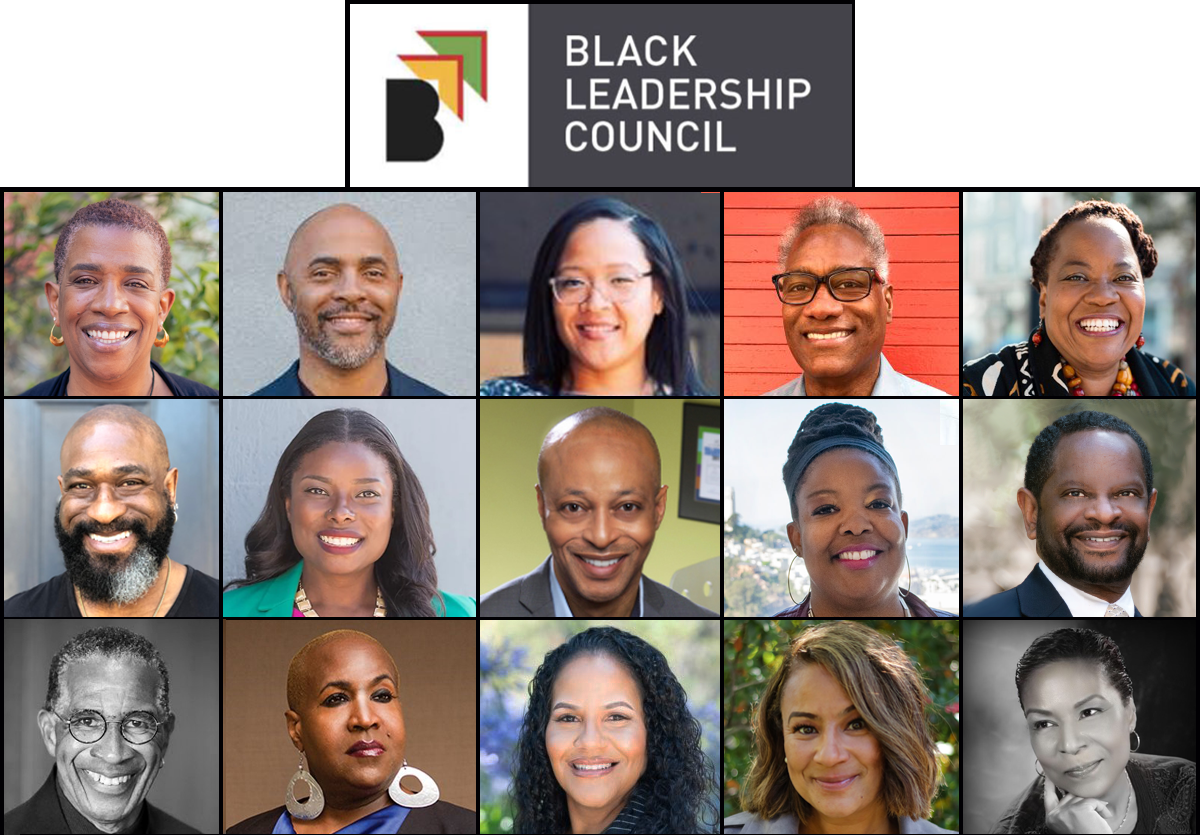The Black Leadership Council – A Year in Review

BLC Members Left to Right
Top Row | Kelly Dearman, Chris Brown, Micah Thomas, Ernest Hopkins, Dr. Diane Johnson
Middle Row | Charles Chip McNeal, Nicole Lindler, Brett Andrews, Tomiquia Moss, Al Gilbert Felton
Bottom Row | James Loyce, Toni Newman, Sarah Tiffany-Richardson, Tasha Henneman, Dr. MaryAnn Jones
What was PRC CEO Brett Andrews to do when he read one heartbreaking statistic after another placing Black San Franciscans dead last after every other group in the San Francisco Department of Public Health’s 2018 Black/African-American Health Report? Throw his hands up in despair? Not likely.
Instead, Brett thought long and hard about what PRC – with its long history of helping San Francisco’s most overlooked, marginalized populations –could do with its resources and influence. So, he convened all the San Francisco Black leaders he could find across public, civic, and private sectors to discuss what they could do. The Black Leadership Council, or the BLC for short, was born.
At first, the group served as a safe space for Black/African American leaders to discuss challenges and best practices within the workplace. Those first few months in 2019, BLC members shared stories, work challenges, and successes, and in doing so, felt relief to find a space to process things together. But following the traumatizing murder of George Floyd, amid Black Lives Matter protests and a national awakening to the long plight of Black Americans, there was a shift. The BLC felt they needed to do more.
They also realized they had unknowingly formed a coalition of direct service providers that could improve conditions not only for San Francisco’s but for all of California’s Black residents through policy work. The BLC decided to focus on advocating for change in four main pillars – housing, health, wealth, and education – and crystallized its goals into a single, comprehensive plan: the California Black Prosperity Agenda.
This collection of policy recommendations aims at achieving system reforms needed to dismantle entrenched racism in California. Through collaboration with the state’s elected officials, over the past year, the BLC has been supporting legislation included in the Black Prosperity Agenda that could unlock the full potential of Black and low-income communities of color. The BLC is starting to see those tireless advocacy efforts pay off.
“As direct service providers, we have to find a way to build a system of prevention and support so that African-Americans are not disproportionately represented when it comes to accessing social services. It is my passion and priority to find a way of stabilizing individuals so that they never have to fall into a level of disenfranchisement, marginalization, and disrepair. If often feels that all we are ever doing is building a system to take care of disadvantaged Black and Brown People, but we need to shift to build a system that allows them to engage in the fullness and franchise of the US, equal to everyone else and the general population.”
– Brett Andrews, CEO, PRC
Last year, the BLC advocated for legislation and funding measures for the elimination of the debt that hinders financial security for the 11 million Californians living in or near poverty, including the elimination of court-inflicted debt, which was part of the state’s historic Build Back Boldly budget. The BLC also supported legislation for expanding broadband infrastructure, requiring implicit bias training for nurses, improving health outcomes for infants, and authorizing the removal of discriminatory and unlawful housing covenants. BLC leaders also provided legislative recommendations for education bills that increase access to technology, incentivize more diversity in the teacher workforce, and expand trauma-informed practices with families.
“The Black Leadership Council (BLC) represents an important and timely response to the injustices of our time. This dynamic group coalesces the knowledge, passion, and expertise from a variety of Black professionals in the Bay Area in service of manifesting the Black Prosperity people deserve. I am passionate about the mission, and I am also grateful for a community space that supports Blackness. BLC puts forth an unapologetically Black narrative about the power of possibility within the Black community.”
– Chip McNeal, Director of Diversity, Equity and Community, San Francisco Opera
Additionally, the BLC established an essential partnership with the Reparations Task Force, which is studying and developing reparation proposals for African Americans in California. The BLC has taken part in numerous Task Force hearings since the initiative’s founding.
“The BLC is a coalition of leaders who prioritize and fight for the prosperity of black people across our state. We came together with a clear mission but we’ve grown into a family bonded by our experiences. We have created a space where black people can have a voice, change our trajectories, impact our community, and take back our power.”
– Nicole Lindler, Senior Advisor for Intergovernmental Relations, Office of Congressional and Intergovernmental Relations
“It has been exhilarating to dive into the work of the BLC. It isn’t easy, but by coming together as a coalition, and uplifting the voices and needs of the Black community, we hope to impact systemic change at scale and create a degree of sustainability that differs from what can be achieved through direct service alone. As Angela Blackwell coined in the term, the ‘curb- cut-effect,’ when we invest and solve problems for those who are most disproportionately impacted, everyone in society benefits.”
-Tasha Henneman, Chief of Public Policy and Government Affairs, PRC
While 2021 was an impactful year for the BLC, members are fully aware of the long journey ahead, and the need to double down. In 2022, thanks to a grant from Metta Fund, the BLC is convening capacity building trainings for member organizations, on topics including improving agency outcomes through analytics, telling compelling stories to elected officials, having courageous conversations about race, and understanding and managing the generational divide within the organization and those served. The BLC will also continue to offer expert testimony at the Reparations Task Force and other relevant legislative hearings, to advocate on behalf of the Black Prosperity Agenda with California lawmakers.
The BLC partners with other local efforts such as Mega Black SF, SFBLOC, the San Francisco Department of Public Health, the San Francisco Human Services Agency, the City’s Office of Health Equity, and the City’s Human Rights Commission’s Dream Keeper Initiative, all of which are working on innovative approaches to achieve racial, health, and social justice and equity for Black San Franciscans.
“We are prioritizing Black prosperity in the state in a way that acknowledges the contributions of Black folks, historically. Every marginalized community has challenges they’re overcoming, but here’s something unique about the Black experience that needs to be acknowledged — the disproportionality of impacts for Black folks in every category you can think of. Leaders coming together with that focus is foundational to being a more equitable state.”
– Tomiquia Moss, Founder & CEO, All Home
It will be another busy year for the BLC, and the organization is always interested in networking and fostering coalition building. If you’re interested in learning more about BLC’s membership, reach out to the BLC’s Director, Tasha Henneman, at [email protected].
With more voices working together in unison, the march toward prosperity is closer than ever.
“I love serving in the BLC with other brilliant African-American leaders pushing equity in our community.”
– Toni Newman, Interim President and CEO for the Black AIDS Institute
blank text space
BLC BY THE NUMBERS
blank text space




blank text space
blank text space
Ask Me (PRC) Anything
PRC’s Chief of Policy and Government Affairs and Director of the Black Leadership Council, Tasha Henneman, addresses the burning questions of what is policy anyway, and why does PRC engage in it?
Well, what is public policy anyway?
Public policy can be defined as guidelines, rules, or laws that govern the work we do. Policy is designed by governmental entities at the local, state and federal levels to create solutions for a range of social challenges experienced by society. Policy has different dimensions, which includes roles for all of us to bring it to life.
Why is PRC expanding into policy work?
By expanding into policy work, PRC is able to better support the individuals we serve. We do this by building relationships with our elected officials (those who create the laws) to inform them of the impact of their policy decisions on their constituents and our community. We also do this by building coalitions with partner organizations.
PRC provides direct services to those affected by policies (ourselves included), so we are able to raise combined concerns and experiences, thus giving voice to people who are typically not seated at the table to influence change. Although in most cases, policies are designed to help people, often there are unintended consequences, which can have negative impacts on people and organizations. This is why it’s crucial that PRC and the BLC are involved in policy work and advocate for ourselves and others.
How does policy work translate into solutions?
Impacting policy change has its own set of challenges. It takes time, coalition building, thoughtful intention, and research. Policy work translates into solutions because it offers a chance to create more equitable opportunities and outcomes for the intended group one is advocating for. When lived experiences and innovative solutions are taken into consideration as policies are being formulated, people’s lives can be changed in a meaningful way. One must consider what part of a problem needs reform and whether current laws are discriminatory and need changing, or if creating new laws to improve conditions is the better method.
At the end of the day, if we create a law but do not empower the public servants who are responsible for carrying it out with the resources or training needed for implementation, then the policy strategy is unfinished. It’s a process that must make its way through the beginning (creation and research) to the end (implementation and evaluation).



